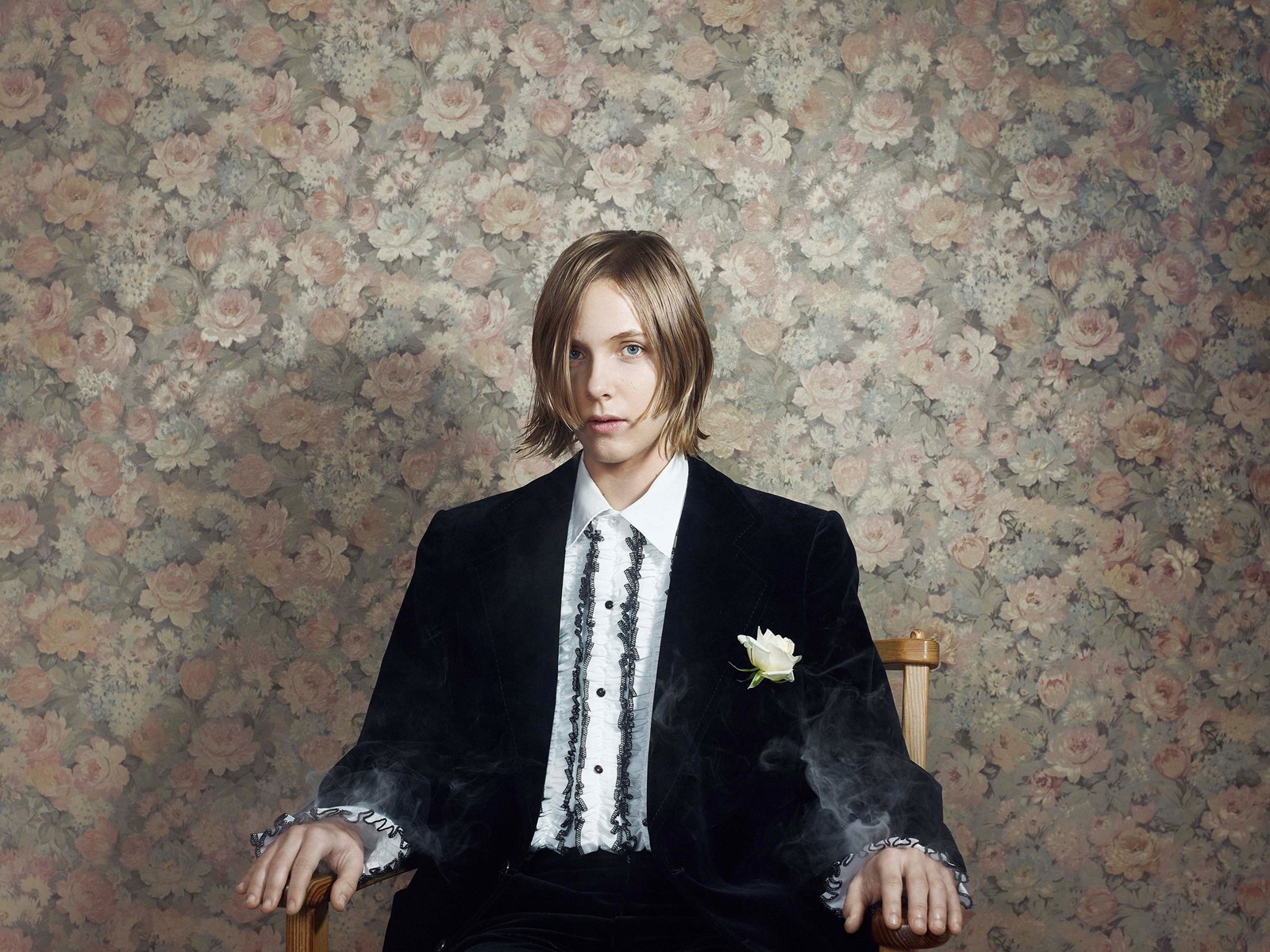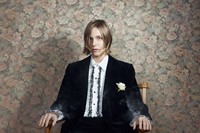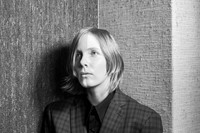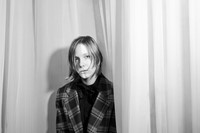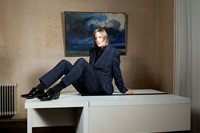Marieke Lucas Rijneveld will make you uncomfortable. In their brutal, Booker-winning debut novel, The Discomfort of Evening, the 29-year-old author paints a portrait of grief that is difficult to stomach. Animals are murdered, orifices are probed and punctured, and childhood innocence is shattered. There are flirtations with incest, paedophilia, and even some scatological interludes. And yet, because it’s all told from the perspective of a ten-year-old girl, it never feels gratuitous. Instead, it reads like an account of compulsive unravelling; of a family ripped from their roots as they react to an unthinkable tragedy.
What makes The Discomfort of Evening all the more remarkable is the fact that it is based, at least partly, on Rijneveld’s own life. Like Jas, their protagonist, the author was raised on a strict protestant farm, in a small village just 50 miles south of Amsterdam. Theirs, too, is a tale of tragedy: When they were just three years old, their brother was killed after being struck by a bus on the way to school. It was a shock that devastated the family and changed the author’s life forever.
Thankfully, Rijneveld’s life is now unrecognisable from the semi-fictional one presented in the pages of The Discomfort of Evening. They are nonbinary, for one thing, (Marieke is slowing transitioning to Lucas, but straddles the boundaries of both male and female), and they have left behind their rural, religious upbringing to set up home in Utrecht. Their novel has also been greeted with international success, and has seen the author – along with their translator, Michele Hutchison – secure this year’s prestigious International Booker Prize. The announcement was “a fantastic, surreal” moment for Rijneveld, who is currently gearing up to release their second novel in the Netherlands (a UK date is yet to be announced).
Here, the author tells us more about their unflinching approach to storytelling, their new novel, and their arduous journey to self-acceptance.
Dominique Sisley: Firstly, how are you? 2020 has been a strange year – how have you been coping?
Marieke Lucas Rijneveld: It’s been such a strange and simultaneously wonderful year – very bizarre. When we entered lockdown in March, my whole daily routine completely changed. I had no more lectures, could no longer go to the gym, and saw very few people. It was lonely on the one hand, but it also allowed me to fully focus on my new book. And that was delicious. I have never written so much and so obsessively. I would work on it for eight hours a day, and then I’d stop and do some cycling or strength training. I repeated this routine day after day. I’ve also been worried a lot about the world, about all the vulnerable people, and have been anxious because everything suddenly felt so unpredictable. But the writing has largely got me through it.
DS: You’ve described yourself as a private person, and yet The Discomfort of Evening – which is very close to autobiographical – is so unflinchingly honest and soul-baring. Were you ever afraid about being this open in your work?
MLR: I did have moments while writing The Discomfort of Evening when I had concerns or doubts about the book, and feared hurting my family. Sometimes it was so intense that I was completely inhibited and hardly dared to pick up the pen. It took a friend of mine to tell me that I had to be ‘inexorable’: that only then could I write the book I wanted to write. I then wrote the word ‘inexorable’ on the wall above my desk. It helped.
It also helped me to think of the book as a novel. Of course, there are similarities with my own childhood or life, but in the end it is really a story in which fiction also plays a major role.
“Although it sometimes feels lonely to be different, I can partly disperse that loneliness by writing. I’m never alone in writing” – Marieke Lucas Rijneveld
DS: It’s also very dark in its humour. I know there was one joke about Hitler that was deemed too offensive to be put into the English version. Do you think it’s important to be provocative, and to push these boundaries?
MLR: In retrospect, I thought it was a shame that the Hitler joke had to be removed. I understand that people are affected by that and that’s not what I want, but it was written from a child’s perspective. It was not intended to be provocative. That’s an important distinction: jokes that come from innocence, or jokes that are intended to provoke and hurt. Of course, I sometimes push the boundaries, but I also think a writer should be able to be honest and have the freedom to write what they want. I don’t use the pen as a weapon, and that’s the most important thing for me. I want to show the complexity of being human, but it’s not my intention to shock the reader.
DS: Are there any subjects that you would consider to be off-limits?
MLR: There are not really any topics that I shy away from. I have trouble with some, but rarely while I’m writing them. It’s often only afterwards when I read it back, that I sometimes think: ‘gosh, how could I have written that?’ I also think boundaries are there to be touched, and that the motive is more important than the boundary itself. Are you doing it to hurt, or are you doing it to bring something to light?
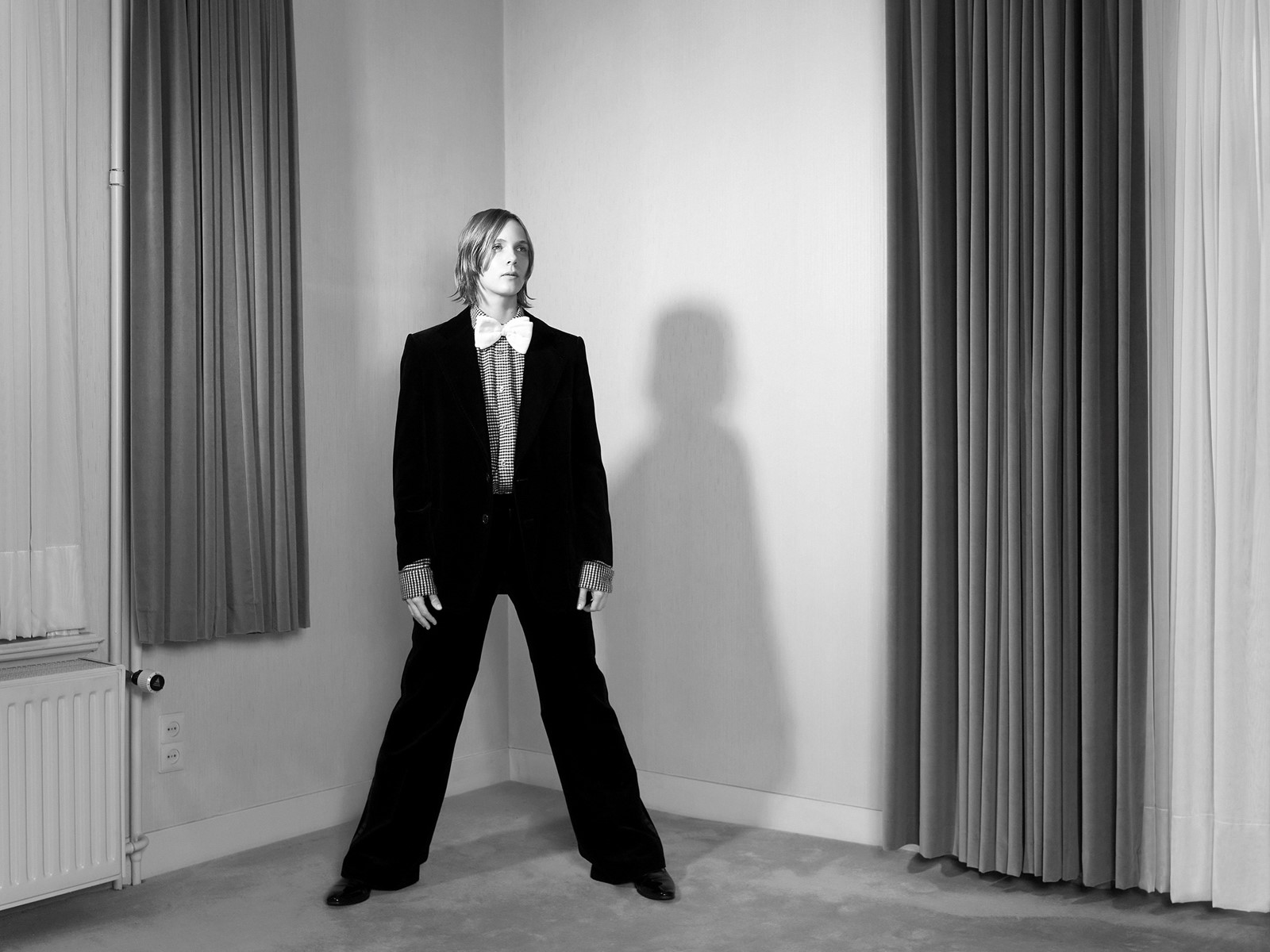
DS: Many of these dark thoughts are coming from Jas, your lead character, who comes across as a real outcast. Do you see yourself as an outcast?
MLR: Yes, I’ve always been different from other people. It was a quality everyone liked in primary school, but in high school it stood out and I was bullied for it. That was painful. I still feel different now, and sometimes dream of being ‘normal’. But on the other hand, I’m also starting to like it more and more, and I can see the good sides of being an outcast. In my work, I can distinguish myself and that is partly because of how I am, and because of how I live. Although it sometimes feels lonely to be different, I can partly disperse that loneliness by writing. I’m never alone in writing.
DS: Does that outsider nature translate to your online life? Have you been able to shun social media?
MLR: To be honest I’m a bit addicted to social media. I have a ‘Lucas series’ on Instagram, for example, where I post a self-portrait every so often and call it Lucas 0.1, 0.2, etc. I’m now on ‘Lucas 2.9’. It’s my way of giving Lucas space, to develop the boy in me.
Social media is also a good way to meet readers, to bring your books into the world. Sometimes it makes me insecure, though. I can feel dependent on this virtual world where people may or may not like you, and don’t have a problem showing it. Selfies, in particular, can make you feel vulnerable, because people judge you by your appearance. But for some reason I feel driven to show Lucas in this way, to feel how close I can get to him.
“I want everyone who struggles with their gender identity to know: you do not have to choose. And if you do choose, it is your choice” – Marieke Lucas Rijneveld
DS: You come from an extremely traditional, religious background. You are also gender-nonconforming. How did your upbringing affect your gender identity, and has ‘Lucas’ – your male self – been accepted by your family?
MLR: The first time I mentioned that I’d rather be a boy, my family reacted with anger and pain. They didn’t understand, and were afraid of losing the girl in me. Only later did they realise that it was not all that radical, and that I was just looking to express myself to the world in a way that suited me. They are more lenient about it now, although we never actually speak about it.
Looking back, I do think their initial reaction increased the confusion around my identity, because I didn’t really have the space to do what felt right. I currently present myself as a kind of in-between person, and that feels good for now. It is nice to feel freer, and I want everyone who struggles with their gender identity to know: you do not have to choose. And if you do choose, it is only your choice.
DS: And what about religion? Do any of the strict religious values from your childhood stay with you today?
MLR: I still believe in God, I never lost that. It’s different from when I was a child, less overbearing, less ‘magical’. But He is always present, just no longer in the foreground. I still carry the lessons from my biblical education with me – not just the love for fellow human beings, but the power of a unified community. I still miss that sometimes; having a community where everyone is there for each other.
I also carry all the beautiful stories from the Bible with me. I learned a lot from the language, from the symbolism. You can argue about whether any of it really happened, but it’s even more beautiful to look at the ideas that lie behind it. From that alone you can infer that God stands for love. That is why I sometimes think it’s a shame that I grew up with such a punishing God. Mankind paints God as punishing, but the Bible isn’t meant to be. Of course, there are horrific stories in there – but when you look beyond that horror, there’s often a different meaning behind it.
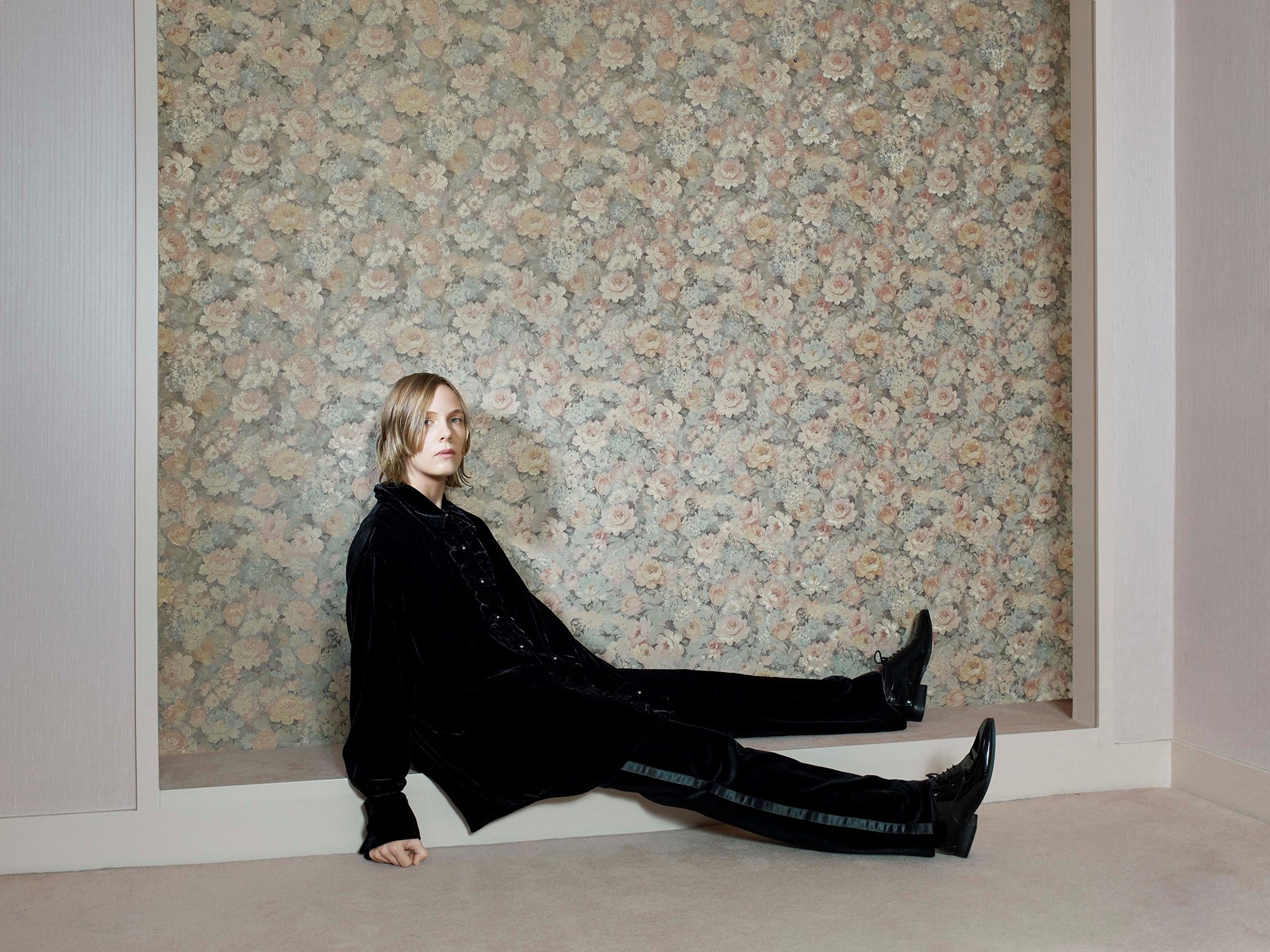
DS: What about your new book? Can you tell me a little bit about that?
MLR: My new novel Mijn Lieve Gunsteling (My Dear Favourite) is the story of the vet and his ‘chosen one’, the daughter of a farmer. During a hot summer, they approach each other because they want to escape the whims of rural life. They then develop an obsessive fascination for each other. It is a heartbreaking yet terrifying tale of loss, forbidden love, loneliness and identity.
DS: The Discomfort of Evening is a book about grief and trauma. It’s also about lovelessness, and feeling unseen. There’s a lot of pain in it. Do you feel like writing has been a healing tool for you?
MLR: I don’t see writing as healing, though it sometimes helps me to open up more. I dig into everything I’ve been through and what I’m going through, like a vole. I can be genuinely happy with a phrase I have found, even when the phrase may be full of sadness. For me, it’s about turning something sad or beautiful into art. That way it might be healing: all sentences are given a place they deserve, and I’m the one who puts them in that place – that’s a privileged role.
The Discomfort of Evening is published by Faber & Faber. The UK release for Mijn Lieve Gunsteling is yet to be announced.
Styling: Analik Brouwer. Hair and make-up: Patricia van Heumen. Photographic assistant: Zoë Zandwijken. Special thanks to Mrs van Stuijvenberg.
